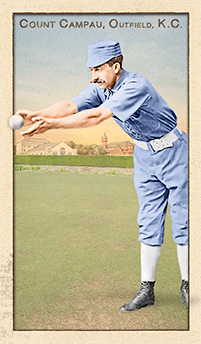- Card series: Beginnings: 1880's
- City: Kansas City
- Team: Blues (WA)
- League: Western Association
Charles Columbus Campau (1863-1938) may have been dubbed “The Count,” but he was the King of the Minors in the 19th century. No one matched his offensive output and he was prized especially for his defense. The scion of the French-Canadian founders of his native Detroit, Campau reigned in the society of the city and its ball fields. Educated at Notre Dame, he began playing there at an early age and soon came to dominate with his power and speed. He left Detroit with mentor Al Buckenberger to begin his pro career with Erie of the Interstate League in 1884. Thus began a two-decade tenure, mostly in the minors, that would take the Count to twenty different clubs including brief stints in the majors. His debut was back home with the Wolverines filling in for an injured Sam Thompson in ‘88. He stayed on with the newly constituted International League version of the Wolverines the following season and would have but one more turn in the big leagues, with the Browns in 1890 (save for two games with the Senators in ‘94). This would allow the hard-hitting Campau to claim a rare (unique?) distinction of leading the (minor league) International League and (major league) American Association in home runs in the same season. Charlie was known for his leadership skills and often served as on-field manager. Browns’ owner Chris von der Ahe used him so in St. Louis that year and would call him “the best captain I have ever had.” Campau’s batting average could fluctuate, but his speed steadily improved to the point he was running foot races for prizes and was reputed to have never lost a match. The sketchy data of minor league stolen bases leaves a lot unknown but his feats were legendary. He swiped 100 bases in ‘87 and was renowned for a “home run” he hit by rounding the bases on a muffed pop-up in front of the plate.
- Campau continued in the minors through the 1905 season and umpired the following year. Never losing his love for speed, Charlie retired and went into the horse racing business and worked around the nation’s tracks in various capacities the rest of his life
- von der Ahe had sacked his prized manager for faithfully enforcing the owner’s own rules. The Count got a bit of revenge the next day, hitting an inside-the-park grand slam to the delight of St. Louis fans who rained down a deluge of cigars. Enough, Campau said, to open his own store
- Campau enjoys five known poses in the Old Judge canon
